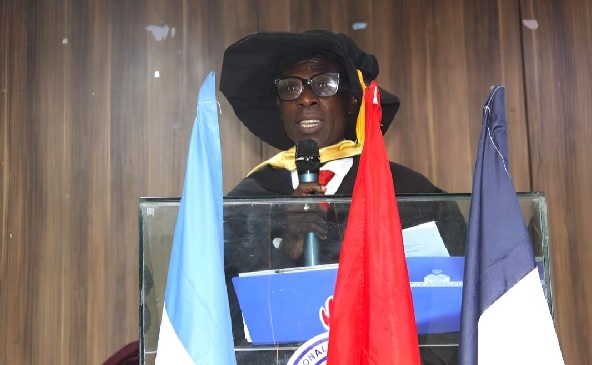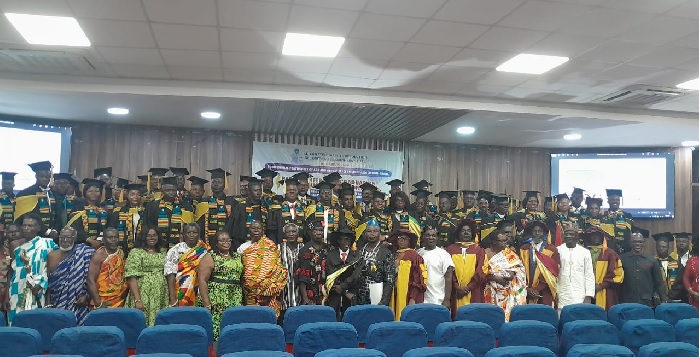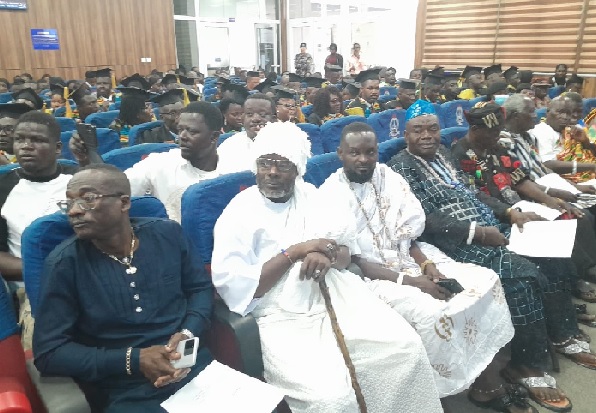
Choose peace over partisanship – President of Alternative Dispute Resolution Institute appeals
The President of the Alternative Dispute Resolution and Research Institute, Ghana, Dr Maxwell Acheampong, has called on Ghanaians to prioritise peace and tolerance ahead of the December 7 general election.
He emphasised that while political propaganda was a natural aspect of democracy, it should not foster division or encourage violence.
Dr Acheampong made these remarks at the institute's 2nd Graduation and Induction Ceremony in Accra last Saturday, where he expressed his belief that "peace is achievable when we all commit to it".
"Today's occasion is exceptional not only for celebrating the achievements of our graduates but also for the critical moment it coincides with in our nation's history - the upcoming Presidential and Parliamentary elections. As we stand at the cusp of what could shape Ghana's future for generations, this ceremony underscores the urgency of fostering peace and security through dialogue and mutual understanding," he said.
"Ladies and gentlemen, the stakes in the upcoming elections are undeniably high. Ghana's strength lies in our unity amidst diversity and it is imperative for all stakeholders - political parties, civil society organisations, traditional leaders and the media to prioritise peace over partisanship," he said.
Addressing disputes
Dr Acheampong highlighted that over the past two years, the institute had remained steadfast in its commitment to resolving disputes and conflicts through innovative Alternative Dispute Resolution (ADR) mechanisms.
“We have trained skilled mediators and negotiators who have become pillars of peace in their communities, both locally and internationally,” he stated.

He added, “Our partnerships with like-minded organisations, both at home and abroad, have strengthened our mission, allowing us to provide sustainable solutions to complex conflicts. It is this track record of excellence that fuels our confidence in saying that peace is achievable when we all commit to it.”
Addressing the graduating class, he urged them, “As we induct a new group of graduates into this noble profession, I encourage you to embrace the principles of neutrality, patience and professionalism. Your work is not merely a career; it is a responsibility to your communities and nation. You are now custodians of peace, and your contributions will play a vital role in ensuring that Ghana emerges stronger, united and more resilient after December 7.”
Peace messages
Several high-profile dignitaries delivered peace messages during the event, including the Deputy Commissioner for CHRAJ, Mrs Mercy Larbi; the Director at Labour Commission, Dr Bernice Welbeck; Dadeban Naa Otublohum, Nii Adjabeng Ankrah II, Nae Wolomo of Ga Traditional Council, Nuumo Akwaa Mensah III; the Personal Assistant to the National Chief Imam, Dr Abubakari Mohammed Azindoo, and a representative from the National Peace Council, Alexander Koomson.

Nae Wolomo of the Ga Traditional Council, Nuumo Akwaa Mensah III, emphasised that elections should not be seen as conflicts, but rather as a platform for exchanging ideas for the nation's betterment. “We must remember that the leaders we elect will not allow their children to be involved in election-related conflicts. Their families will not engage in such disputes, so why should we? Let us come together to ensure a peaceful 2024 election and maintain peace afterward.”
Alexander Koomson from the National Peace Council reflected on the event’s theme, "Bridging Divides, Healing the Land: Cultivating Peace and Sustainability for Ghana's Future", describing it as a reflection of the collective efforts of individuals, communities and the nation as a whole. He urged everyone to commit to fostering peace.
"In a world where differences too often sow discord, our commitment to understanding, dialogue and reconciliation must be unwavering. Let us not forget that peace and sustainability are two sides of the same coin. Without peace, development falters; without sustainable practices, the peace we strive for remains fragile," he said.
"The National Peace Council remains steadfast in its mission to promote peace and harmony across Ghana. Yet, this mission cannot be achieved by one institution alone. It requires partnerships—between organisations like this institute, the government, civil society, and, most importantly, individuals like you. Each act of mediation, every effort to resolve disputes amicably, contributes to a broader culture of peace," he added.
Graduation and induction
A total of 87 students from Cohorts 3, 4 and 5 graduated from the institute after completing 10 weeks of intensive training.
The courses they undertook included Religious Conflicts and Dispute Resolution, Principles of Mediation in Alternative Dispute Resolution (ADR), Professional Ethics and Standards of ADR Practice, Online Dispute Resolution, Communication Skills in ADR, and Principles of International Public and Humanitarian Law.
